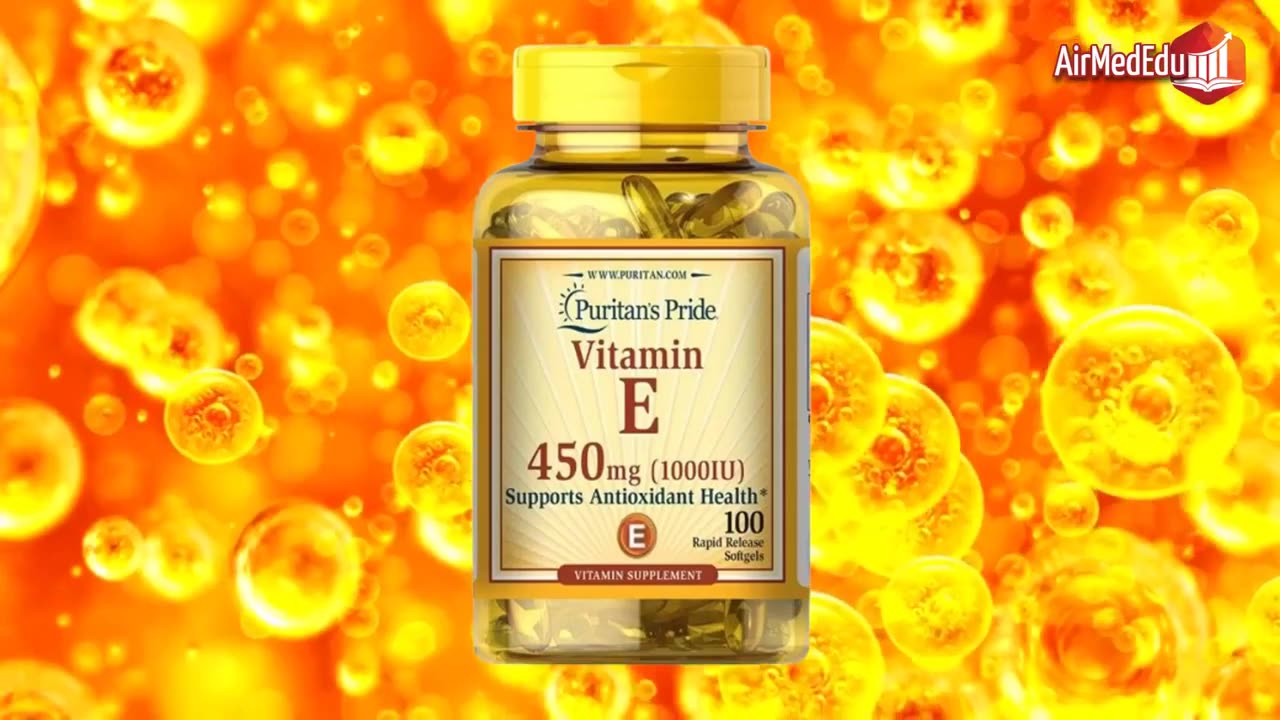Premium Only Content

Vitamin E Tocopherol, An Ally for Comprehensive Health in Maturity
As we age, our bodies undergo a series of physiological changes that impact our health and quality of life. These include loss of muscle mass, cognitive decline, and an increased risk of cardiovascular disease. In this context, vitamin E, also known as tocopherol, is emerging as a dietary supplement with significant potential to support the overall health of adults aged 40 to 65+.
Vitamin E is a fat-soluble antioxidant that plays a crucial role in protecting cells from oxidative damage, a process that accelerates with age and is associated with various chronic diseases. Furthermore, its positive impact on cardiovascular, cognitive, joint, and immune health makes it an essential nutrient for those seeking to maintain their well-being at this stage of life.
Next, we'll explore how vitamin E can benefit specific organs and key body systems, helping to mitigate the effects of aging and promote a healthier, more active life.
Before delving into its benefits, it's important to understand how to safely incorporate vitamin E into our diet. The recommended daily dose for adults ranges from 15 to 20 milligrams, depending on factors such as sex, age, and health conditions. This vitamin is found naturally in foods such as nuts (almonds, hazelnuts), seeds (sunflower), vegetable oils (olive, sunflower), and green leafy vegetables (spinach, broccoli).
While supplements are a useful option to achieve optimal levels, it is essential to consult a doctor before starting supplementation, especially if you are taking blood-thinning medications or suffer from chronic illnesses. Excessive doses of vitamin E can interfere with blood clotting and cause adverse effects. Therefore, a balanced and supervised approach is key to reaping its benefits safely.
Vitamin E acts as an antioxidant guardian, protecting cell membranes from oxidative stress caused by free radicals. This mechanism has direct implications for several organs and systems in the body:
The heart is one of the organs most benefited by the antioxidant action of vitamin E. It helps reduce the oxidation of LDL cholesterol ("bad cholesterol"), a key factor in the formation of arterial plaques that can lead to cardiovascular disease. Additionally, it improves the elasticity of blood vessels and promotes better circulation, reducing the risk of hypertension and stroke. For older adults, this is crucial, as the cardiovascular system tends to weaken over time.
With aging, the brain is particularly vulnerable to oxidative stress, which can contribute to cognitive decline and the development of neurodegenerative diseases such as Alzheimer's. Vitamin E helps protect neurons by neutralizing free radicals and improving cellular communication. This not only helps preserve memory and concentration but also promotes better overall mental health in older adults.
Chronic inflammation is one of the main causes of joint pain and stiffness in older adults. Vitamin E has anti-inflammatory properties that can reduce these symptoms by decreasing the production of pro-inflammatory molecules in the joints. Additionally, by protecting muscle cells from oxidative damage, it can help preserve muscle mass, a critical factor in maintaining mobility and preventing falls at this stage of life.
With age, the immune system tends to weaken, increasing susceptibility to infections and diseases. Vitamin E stimulates the production of immune cells such as T lymphocytes, thereby improving the body's ability to fight pathogens. This is especially relevant for older adults looking to strengthen their natural defenses and stay healthy longer.
Although not an internal organ, the skin is our first barrier against external aggressors. With aging, it becomes thinner and more prone to damage from factors such as ultraviolet rays and pollution. Vitamin E helps keep it hydrated, elastic, and protected from oxidative stress, helping to reduce visible signs of aging such as wrinkles and dark spots.
The eyes are also susceptible to oxidative damage over time, which can lead to diseases such as cataracts and age-related macular degeneration. Vitamin E protects retinal cells and improves their ability to process light, thus contributing to better eye health in older adults.
The liver plays a crucial role in the body's metabolism and detoxification. Vitamin E helps protect it from damage caused by toxins and accumulated fats, promoting its proper function even in advanced age.
Vitamin E also supports hormonal balance by protecting endocrine glands from oxidative damage. This can be particularly helpful for postmenopausal women facing significant hormonal changes.
Taken together, these benefits make vitamin E an essential nutrient for holistically addressing the challenges associated with aging.
Vitamin E is not a magic bullet or a substitute for a healthy lifestyle; however, its inclusion in a balanced diet can make a significant difference in how we age. From protecting the heart to preserving mental acuity and improving joint mobility, its benefits span multiple key aspects of our health.
To maximize its positive effects, it is essential to combine its consumption with a nutrient-dense diet, regular exercise, and periodic medical checkups. Before incorporating vitamin E supplements into your daily routine, consult with a healthcare professional to ensure it is appropriate for your individual needs.
Remember: taking care of your body today is investing in its future well-being. Vitamin E can be a valuable tool on that path to a fuller, more active life at every stage of aging.
-
 14:26
14:26
Upper Echelon Gamers
4 hours ago $0.39 earnedThe Carvana Scam - A Predatory BUBBLE
3.66K3 -
 LIVE
LIVE
LFA TV
21 hours agoLIVE & BREAKING NEWS! | FRIDAY 11/14/25
871 watching -
 LIVE
LIVE
Dr Disrespect
7 hours ago🔴LIVE - DR DISRESPECT - BLACK OPS 7 - LAUNCH DAY CHAMPION
1,053 watching -

StoneMountain64
5 hours agoCall of Duty Black Ops 7 Gameplay LAUNCH DAY
34.8K -
 18:15
18:15
Clintonjaws
6 hours ago $6.01 earnedCNN Audience Shocked By Dem's Slanderous Comments At Trump
32.5K20 -
![MAHA News [11.14] - Govt War on Small Ranchers, GLP-1 Craze, Hemp Ban, Mercury out of Vaccines](https://1a-1791.com/video/fww1/f2/s8/1/i/X/E/z/iXEzz.0kob-small-MAHA-News-11.14.jpg) 1:23:00
1:23:00
Badlands Media
13 hours agoMAHA News [11.14] - Govt War on Small Ranchers, GLP-1 Craze, Hemp Ban, Mercury out of Vaccines
19.9K3 -
 1:23:17
1:23:17
The Quartering
6 hours agoTucker Reveals FBI Coverup For Trump Assassin, Walmart CEO Quits & Tim Pool Unleashes
63.2K65 -
 34:23
34:23
Tucker Carlson
10 hours agoWho Is Thomas Crooks?
350K512 -
 2:05:33
2:05:33
The Culture War with Tim Pool
20 hours agoDating In The Modern Age DEBATE, Myron Gaines vs Brian Shaprio | The Culture War LIVE Debate
106K160 -
 1:10:18
1:10:18
Sean Unpaved
6 hours agoTreVeyon Henderson Scores 3 TD's As Patriots DOMINATE Jets! | UNPAVED
31.9K4